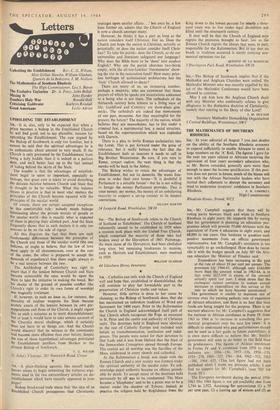ih min Letters Upholding the Establishment Rev. C. G. Wilson,
Miss Gillian Hawtin, William Glashan, Quentin de la Bedoyere, I. M. Neilson The Mathematics of Southern Rhodesia
The High Commissioner, Leo S. Baron The Exclusive Taylorites Dr. A. Piney, John Bellak Mixing It John Horder Zambia's Holy War Ronald Hall Criticising Goldwater Kathryn Rondall Good Americans Leslie Adrian
UPHOLDING THE ESTABLISHMENT Sia,—It is, alas, only to be expected that when a priest becomes a bishop in the Established Church he will find good, not to say plausible, reasons for Upholding the Establishment. The case argued by the Bishop of Southwark is only too familiar, but it cannot be said that the spiritual advantages he is so enthusiastic about amount to very much. If the Church is only prevented by the Establishment from being a holy huddle then it is indeed in a parlous state, and we'd better face up to the fact instead of hiding behind the skirts of the State.
The trouble is that the advantages of establish- ment begin to seem so important, especially to bishops, that great care is taken to avoid disturbing the delicate balance between Church and State that is thought to be -so valuable. What this balance means in practice is that in most vital matters the principles of the Church become equated with the Principles of the secular world.
Of course, there are certain .accepted exceptions to this comfortable rule: nobody minds bishops fulminating about the private morals of people in the secular world—this is exactly what is expected of them in playing their allotted part. And the State frequently shows that in such matters it is only too anxious to be on the side of rigour.
All this disguises the fact that there are such fundamental differences between the principles of the Church and those of the secular world (the one believes, or ought to believe, that the law of love must apply in all circumstances, even at the cost of the cross; the other is prepared to accept the demands of expediency) that there ought always to be a real tension between the two.
The Archbishop of Canterbury was right to assert that if the tension between Church and State became unbearable the onus would be upon the State to take the initiative in making the break. But his choice of the ground of possible conflict (the Church's right to order its own forms of worship) was tragically irrelevant.
If, however, in such an issue as, for instance, the morality of nuclear weapons the State became acutely aware of the tension between its own pre- suppositions and those of the Church, it might regard this as such a nuisance as to merit disestablishment; but at least it would have to take serious account of the Church's moral challenge, which it certainly does not have to as things are. And the Church would discover that its witness in the community had become more effective than ever before, despite the loss of those hypothetical advantages postulated by Establishment justifiers from Hooker to the present Bishop of Southwark.
C. G. WILSON
St. John's Vicarage, 263 Nantwich Road, Crewe




























 Previous page
Previous page